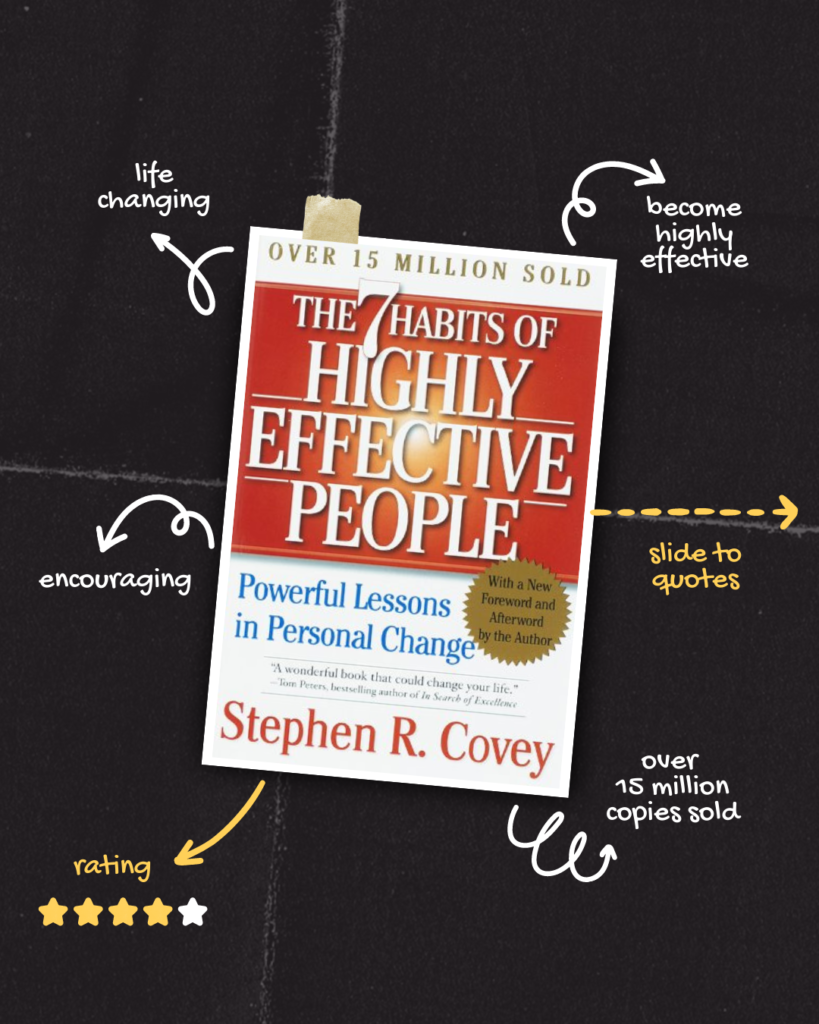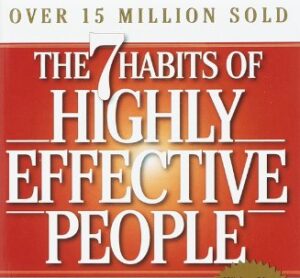The 7 Habits of Highly Effective People by Stephen Covey is a book that has transformed the lives of millions of people worldwide. It is a timeless classic that provides practical and actionable advice on how to become more effective in all areas of life. Whether you are a student, a professional, or a stay-at-home parent, this book is a must-read for anyone who wants to achieve their goals and live a fulfilling life.

5 Key takeaways from the book
- The Circle of Influence and Circle of Concern: The Circle of Concern encompasses all the things we worry about, while the Circle of Influence includes the things we can actually control. By focusing our energy on the Circle of Influence, we can become more proactive and effective in our lives, rather than wasting time worrying about things beyond our control.
- The Emotional Bank Account: Emotional Bank Account represents the trust and goodwill we have with others. Just like a financial bank account, we can make deposits and withdrawals from this account through our actions and behavior. By making regular deposits, such as showing kindness, empathy, and understanding, we can build strong relationships with others. On the other hand, withdrawals, such as dishonesty and disrespect, can damage these relationships. It’s crucial to maintain a positive balance in our Emotional Bank Account to foster healthy relationships.
- The Power of Synergy: Synergy is the idea that the whole is greater than the sum of its parts. In the context of the book, it means that when people work together effectively, they can achieve more than they could individually. By embracing diversity and valuing the unique strengths of each team member, we can create an environment where everyone can contribute their best, leading to better results and increased satisfaction.
- The Importance of Self-Renewal: Covey emphasizes the need for continuous self-improvement and growth. This involves regularly investing time and energy in nurturing our physical, mental, emotional, and spiritual well-being. By doing so, we can maintain a balanced and fulfilling life, which in turn enables us to be more effective in our personal and professional lives.
- The Paradigm Shift: A paradigm is the way we perceive and interpret the world around us. Covey teaches us that our paradigms can greatly influence our effectiveness and success. By being open to new perspectives and challenging our existing beliefs, we can experience paradigm shifts that lead to significant improvements in our lives.
The 7 Habits of Highly Effective People is a self-help book written by Stephen Covey, first published in 1989. Covey was an American educator, author, businessman, and keynote speaker. He was also a professor at the Jon M. Huntsman School of Business at Utah State University.

Covey’s book is based on his research of successful people and their habits. He interviewed over 200 people, including business leaders, politicians, and athletes, to understand what made them successful. He also drew inspiration from various philosophical and religious traditions, including the teachings of Benjamin Franklin, Mahatma Gandhi, and Viktor Frankl.
This book has sold over 25 million copies worldwide and has been translated into 40 languages. It has been praised for its practical advice and its emphasis on personal responsibility and self-improvement.
Covey passed away in 2012, but his legacy lives on through his books and teachings. The 7 Habits of Highly Effective People remains a popular and influential book in the self-help genre.
Who should read this book?
Anyone who wants to become more effective in all areas of life should read The 7 Habits of Highly Effective People. The book is especially relevant for students, professionals, and entrepreneurs who want to achieve their goals and make a positive impact in the world. The book is also a great resource for anyone who wants to improve their relationships and build stronger communities.

Looking for a life-changing read that will transform your personal and professional life?
This timeless classic has helped millions of people around the world achieve success and fulfillment.
Order your copy today and start your journey towards success and happiness!
What are the 7 habits of highly influential people?
Habit 1: Be Proactive
This habit is about taking responsibility for your life and actions. Instead of blaming external factors, focus on what you can control. For example, imagine you’re stuck in traffic and running late for a meeting. Instead of getting frustrated, use the time to make important calls or plan your day
Habit 2: Begin with the End in Mind
This habit encourages you to set clear goals and envision the desired outcome. For instance, a student who wants to become a doctor should plan their studies and extracurricular activities accordingly, keeping their end goal in mind.
Habit 3: Put First Things First
This habit is about prioritizing tasks and managing time effectively. For example, a busy parent might prioritize spending quality time with their children over watching TV or scrolling through social media.
Habit 4: Think Win-Win
This habit emphasizes the importance of seeking mutually beneficial solutions in relationships and negotiations. For instance, two colleagues working on a project might have different ideas. Instead of insisting on their own way, they can collaborate and find a solution that benefits both of them.
Habit 5: Seek First to Understand, Then to Be Understood
This habit encourages active listening and empathetic communication. For example, a manager might listen to an employee’s concerns and try to understand their perspective before offering solutions or advice.
Habit 6: Synergize
This habit is about working together and leveraging the strengths of others to achieve more than you could alone. For instance, a sports team with diverse skills and talents can work together to achieve victory, even if each individual player isn’t the best in their position.
Habit 7: Sharpen the Saw
This habit focuses on self-improvement and maintaining a balance between physical, mental, emotional, and spiritual well-being. For example, a successful entrepreneur might take time off to exercise, meditate, and spend time with family, ensuring they stay healthy and motivated in the long run.
Stories from the book
The Green and Clean Story
In the book, The 7 Habits of Highly Effective People, Stephen Covey shares a story about a man who was struggling to keep his lawn green and clean. The man’s neighbor had a beautiful, lush, green lawn, which made the man feel envious and frustrated with his own lawn. He tried everything he could think of to improve his lawn, including watering it more, using different fertilizers, and even talking to it. However, nothing seemed to work.

One day, the man decided to ask his neighbor for advice. The neighbor told him that the secret to his beautiful lawn was not in the watering or fertilizing, but in the way he took care of it. He explained that he mowed his lawn regularly, pulled out the weeds, and aerated the soil. The neighbor also mentioned that he used a specific type of grass seed that was more suitable for the local climate.
The man realized that he had been focusing on the wrong things and that he needed to change his approach. He started to implement the neighbor’s advice and, over time, his lawn began to improve. This story illustrates the importance of focusing on the right things and adopting effective habits to achieve desired results.
Covey uses this story to introduce the concept of “Paradigm Shift,” which means changing our perspective and approach to a problem. The man’s initial approach to his lawn problem was based on his limited understanding and perspective. By seeking advice from his neighbor and adopting new habits, he was able to change his perspective and achieve better results.
The Golden Eggs and the Goose

Another story from The 7 Habits of Highly Effective People is the fable of the Goose that Laid the Golden Eggs. In this story, a farmer discovers that his goose is laying golden eggs. He becomes very wealthy and happy, but soon his greed takes over. He wants more golden eggs, and he wants them faster. So, he decides to kill the goose and take all the golden eggs at once. However, when he opens the goose, he finds that there are no golden eggs inside. In his greed, the farmer has destroyed the source of his wealth.
Covey uses this story to illustrate the concept of “Effectiveness.” He explains that effectiveness is a balance between two elements: production (the golden eggs) and production capacity (the goose). In the story, the farmer focused only on the production (the golden eggs) and neglected the production capacity (the goose). As a result, he lost both.
This story teaches us the importance of maintaining a balance between achieving our goals (the golden eggs) and taking care of the resources that help us achieve those goals (the goose). In our personal and professional lives, we must focus on developing and nurturing our skills, relationships, and well-being (the goose) to ensure that we can continue to achieve our goals and be successful (the golden eggs).
Interesting quotes from the book
- “The key is not to prioritize what’s on your schedule, but to schedule your priorities.” – This quote emphasizes the importance of prioritizing important tasks and activities in order to achieve goals.
- “Synergy is the highest activity of life; it creates new untapped alternatives; it values and exploits the mental, emotional, and psychological differences between people.” – This quote emphasizes the importance of collaboration and teamwork in achieving success.
- “Most people do not listen with the intent to understand; they listen with the intent to reply.” – This quote highlights the common communication problem of people not truly listening to each other and instead focusing on their own response.
- “The way we see the problem is the problem.” – This quote emphasizes the importance of shifting one’s perspective and mindset in order to solve problems effectively.
- “To change ourselves effectively, we first had to change our perceptions.” – This quote highlights the importance of self-awareness and personal growth in achieving success.
- “Habit is the intersection of knowledge (what to do), skill (how to do), and desire (want to do).” – This quote emphasizes the importance of developing good habits in order to achieve success.
- “You have to decide what your highest priorities are and have the courage – pleasantly, smilingly, non-apologetically – to say ‘no’ to other things. And the way you do that is by having a bigger ‘yes’ burning inside.” – This quote emphasizes the importance of saying no to distractions and focusing on one’s highest priorities.
- “The proactive approach to a mistake is to acknowledge it instantly, correct and learn from it.” – This quote emphasizes the importance of taking responsibility for one’s mistakes and using them as opportunities for growth and learning.
Books similar to ‘The 7 habits of highly influential people’
- Atomic Habits by James Clear – This book is similar to The 7 Habits of Highly Effective People as it also focuses on developing good habits and breaking bad ones. James Clear provides practical strategies for making small changes that can lead to big results. He emphasizes the importance of focusing on the process rather than the outcome and creating systems that make it easier to stick to good habits.
- The Power of Habit by Charles Duhigg – This book explores the science behind habit formation and how we can use that knowledge to change our behavior. Like The 7 Habits of Highly Effective People, it emphasizes the importance of self-awareness and taking responsibility for our actions. Duhigg provides real-life examples of how people have successfully changed their habits and offers practical advice for doing the same.
- Mindset by Carol Dweck – This book is similar to The 7 Habits of Highly Effective People as it focuses on the importance of mindset in achieving success. Carol Dweck argues that people with a growth mindset, who believe that their abilities can be developed through hard work and dedication, are more likely to achieve their goals than those with a fixed mindset, who believe that their abilities are set in stone. She provides practical strategies for developing a growth mindset and overcoming obstacles.
Criticism or Controversies around the book
While The 7 Habits of Highly Effective People is widely regarded as a classic self-help book, it has also faced some criticism and controversy over the years.
One criticism of the book is that it can be overly simplistic and formulaic. Some readers feel that the seven habits are presented as a one-size-fits-all solution to all of life’s problems, without taking into account the unique circumstances and challenges that each individual faces.
Another criticism is that the book can be overly focused on individual achievement and success, without enough emphasis on the importance of community and social responsibility. Some readers feel that the book promotes a “me-first” mentality that can be harmful to society as a whole.
There has also been some controversy around Stephen Covey himself. Some critics have accused him of promoting a conservative, pro-business agenda that prioritizes individual success over social justice and equality. Others have criticized his use of religious language and imagery in the book, which they feel is exclusionary to readers who do not share his beliefs.
Despite these criticisms and controversies, The 7 Habits of Highly Effective People remains a popular and influential book that has helped millions of readers improve their personal and professional lives.
What are your views on this book? Let us know in the comments. And in case you haven’t read it yet – buy your copy now!
The 7 habits of highly influential people

The 7 Habits of Highly Effective People by Stephen Covey is a book that has transformed the lives of millions of people worldwide. It is a timeless classic that provides practical and actionable advice on how to become more effective in all areas of life. Whether you are a student, a professional, or a stay-at-home parent, this book is a must-read for anyone who wants to achieve their goals and live a fulfilling life.
URL: https://amzn.to/3OGO5Ht
Author: Stephen R. Covey
4.5
